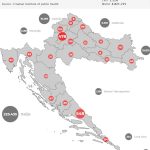
June 27, 2020 – As UK media report a Green Light for Croatia, a word of caution in these frustratingly uncertain times – nothing official has been confirmed. And an official communication from the British Government.
Frustration levels are rising. People just want to know when they can go on holiday and where.
Nowhere is this more true than in the UK, whose nationwide lockdown and restrictive life has gone on for weeks, but is finally due to be eased on July 4.
For the latest travel info, bookmark our main travel info article, which is updated daily.
Read the Croatian Travel Update in your language – now available in 24 languages
Join the Total Croatia Travel INFO Viber community.
The Netherlands – as of July 21, Croatia is placed on the “Orange” list by the Dutch government, which means that both the Croatian nationals and the Dutch nationals returning to the Netherlands from Croatia are strongly advised to self-quarantine for 14 days.
While Brits have been able to come to Croatia on holiday with paid accommodation for several weeks, they need to self-isolate for 14 days on their return.
The discussion of air bridges – corridors with participating tourism countries with a good corona record – have been under discussion for some time now. The idea is that these countries are very low-risk for the virus, and so there is no need to self-isolate on the return home. This scheme would obviously be a major tourism boost for the participating countries, but it obviously comes with the very real risk of increased infections being imported by British tourists.
An impossible balance to get right.
UK media are reporting that a new traffic light system is about to be introduced in early July (one national paper has stated July 6), which would enable free travel to some countries, with restrictions on others. Please note that this has NOT been officially confirmed.
IF true, then it looks like a green light for Croatia.
Green light – Austria, Barbados, Croatia, Germany, New Zealand, Greece, Thailand and Vietnam.
The “green” list of countries with no significant coronavirus risk will consist of small island nations and other countries which never suffered a major epidemic of the virus.
Amber light – Australia, Belgium, Canada, Denmark, France, Italy, Japan, Netherlands, Portugal, Singapore, South Korea, Switzerland and Spain.
The “amber” list have had serious Covid-19 outbreaks but the risk of infection is now low.
Red light – Argentina, Brazil, Chile, Colombia, Egypt, India, Israel, Mexico, Morocco, South Africa and USA.
HOWEVER…
I know that everyone wants this to be true, but nothing has been officially confirmed, and a couple of sources have told me that final decisions have not yet been made.
I want to also remind you of that magical date of June 15, when Croatia and the rest of the EU was supposed to open its borders. There was intense speculation, but nothing was announced. I asked Tourism MInister Gari Cappelli (Croatia currently holds the EU Presidency) in an interview published on June 4 if the borders would in fact open on June 15. His reply was not a confirmation. And in the end, nothing changed on Croatia’s borders on June 15.
Officials are still working on final details. A government source said: “What we don’t want is people booking just yet while details are being worked out.”
An official statement from the British Government, republished in full.
The Government is concluding the first review of its Public Health Measures at the border for those entering the UK from abroad, based on robust public health criteria, with full details expected to be set out next week.
In line with the roadmap we set out on 11 May, self-isolation requirements were introduced for those coming into the UK three weeks ago for public health reasons to reduce the risk of new cases of infection being brought into the UK from abroad. This policy is a crucial part of our plan to prevent a second wave of coronavirus infections in the UK, and will continue to be so.
We will continue to keep these measures in place for international arrivals from countries not yet deemed to be safe, as well as requirements for all passengers entering the UK to supply their contact information. On the 11 May we set out that these measures would be kept under regular review. Now that the risk of infections being imported from certain countries is lower the Government will therefore soon be able to disapply public health measures at the border to arrivals from those countries.
This will make it easier for people to travel to those countries by removing the requirement to self-isolate for 14 days on their return, although they will still be required to complete a passenger locator form in order to enter the UK. This is only possible alongside constant monitoring of each country’s situation to ensure we avoid a resurgence of coronavirus in the UK. And we will not hesitate to put on the brakes if any risks re-emerge in the UK or within those countries we deem to be on our covid travel list.
We know many people may not yet choose to travel, but this cautious change will allow those who need to travel for work to do so without the need to self-isolate on their return, as well as those who may want to holiday abroad this summer, and also provide a vital lifeline for UK travel operators and those whose jobs rely on the travel industry.
The Joint Biosecurity Centre, in close consultation with Public Health England, has drawn up a categorisation of countries it is deemed safe for people to enter the UK from without needing to self-isolate based on strict public health criteria.
Countries have been classified as green, amber and red depending on their risk assessment, informed by factors including the prevalence of coronavirus within the country, our confidence in the reliability of their data, and crucially the trajectory of the disease in the country. Low risk countries in the green and amber categories will be exempt from public health measures at the border.
A strict handbrake mechanism will be put in place so that if an outbreak occurs in another country – even within a particular part of the country – or if we have concerns about increasing numbers of cases in an individual country, their risk category will change and we will immediately reintroduce self-isolation requirements. These measures will be kept under constant review and we will be able to reimpose public health measures at the borders for individual countries where the risk changes immediately.
A full list of the low-risk countries in the green and amber categories where people will be able to enter the UK from without being required to self-isolate will be published next week, and it is expected that travel will be able to resume with countries on our covid travel list the following week.
The UK is likely to discuss these arrangements with countries including France, Greece and Spain over the coming days.
Airports, ports and Eurotunnel have worked hard to put in place covid secure requirements to keep those travelling as safe as possible, and all passengers will be required by law to wear face coverings on planes and ferries to protect others.
A Government spokesperson said:
“Our public health measures at the border were put in place to manage the risk of imported cases and help prevent a second wave of the virus, and will continue to support our fight against coronavirus.
“Our new risk-assessment system will enable us to carefully open a number of safe travel routes around the world – giving people the opportunity for a summer holiday abroad and boosting the UK economy through tourism and business.
“But we will not hesitate to put on the brakes if any risks re-emerge, and this system will enable us to take swift action to re-introduce self-isolation measures if new outbreaks occur overseas.”
For the latest travel info, bookmark our main travel info article, which is updated daily.
Read the Croatian Travel Update in your language – now available in 24 languages
Join the Total Croatia Travel INFO Viber community.










